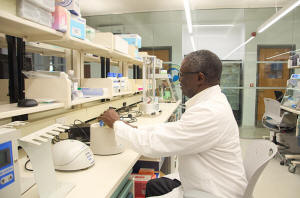MacArthur Foundation awards $100M to outbreak surveillance network, a
boost amid global health cuts
[November 19, 2025]
By JAMES POLLARD
NEW YORK (AP) — The MacArthur Foundation is awarding $100 million to a
private pandemic prevention network across Africa, offering critical
support to infectious disease surveillance at a time when governments
are reducing global health spending.
It was announced Tuesday that Sentinel — a project that creates
cost-effective pathogen detection tests, monitors outbreaks with
real-time tracking tools and trains local scientists to carry out
community-led responses — won the MacArthur Foundation's 100&Change
competition.
Sentinel reports training more than 3,000 public health workers from 53
of Africa’s 54 countries. The award money will help expand its
geographic reach over the next five years, creating a more robust system
that can better alert local communities — and, in turn, the world — to
previously undetected diseases.
“This investment affirms that solutions to global health challenges can
be led from Africa,” Sentinel co-director Christian Happi, who leads the
Institute of Genomics and Global Health at Redeemer’s University in
Nigeria, said in a statement. “Sentinel is about trust, collaboration,
and building the systems that allow every country to respond swiftly and
confidently to disease threats."
With the MacArthur Foundation's recognition of an African initiative
that is empowering public health officials from the bottom up, the
heavyweight American philanthropy hopes to encourage similar investments
from its peers.
In the ten years since starting 100&Change with the issue-agnostic goal
of driving philanthropy to pursue bolder endeavors and larger grants, an
official said they’ve seen just that — as well as more concern for
global health.

“This grant is further wind in those sails, I'd say” said Chris Cardona,
the managing director of Exploration, Discovery and Programs at the
MacArthur Foundation. "But given the scale of the challenge and the size
of the funding gaps, there’s much more to be done.”
“We are glad to shine that spotlight and to show the value for U.S.
donors of funding internationally — especially to projects that are
bridging and building capacity across countries like Sentinel is doing,"
he added.
Meanwhile, global health programs are contending with fewer funds and
less cooperation as major donor countries deprioritize multilateral
efforts.
Gavi, a public-private alliance that has paid for more than 1 billion
children to be vaccinated, faces a replenishment shortfall as U.S.
President Donald Trump's administration cut the country's support. U.S.
Centers for Disease Control and Prevention staff were told earlier this
year to stop working with the World Health Organization, a move that
experts warn will impede work on stopping outbreaks such as mpox in
Africa.

[to top of second column]
|

Dr. Christian Happi, sits inside the laboratory at the Institute of
Genomics and Global Health, in Ede Southwestern, Nigeria, Nov. 17,
2025. (AP Photo/Ajayi Oluwapelumi)

The Trump administration has vowed to prioritize disease surveillance as
it turns sharply from traditional U.S. foreign assistance. But it has
also sought to cancel $500 million for activities related to infectious
diseases and child and maternal health and another $400 million to
address the global HIV epidemic.
So uncertain is the state of global development commitments that the
Gates Foundation, one of the most powerful institutions in global
health, delayed its annual report on the progress toward those goals.
“This work in Africa would be important because, as the U.S. and
European nations pull out from support globally, we will have less
visibility of what’s going on overseas," said Dr. Ali S. Khan, dean of
the University of Nebraska Medical Center College of Public Health.
Sentinel began as a collaboration between Happi’s lab and Dr. Pardis
Sabeti’s lab at the Broad Institute in Cambridge, Massachusetts, on
Lassa fever. Traveling into villages where the virus was spreading
provided key insights they wouldn’t have had without deeply embedding in
the community, according to Sabeti.
They've now set out to provide those communities with the diagnostic
technologies and professional connections necessary to identify, control
and send early warnings about new threats.
Sabeti said the award is “transformative” considering that public health
is being “decimated” and the field faces “existential crises.” When the
United States no longer supports other countries’ efforts to stop
pandemics like it used to, she said, local frontline responders must be
empowered.
“By giving people in communities the information that they need, they
end up becoming sentinels for an emerging outbreak,” Sabeti said. “And
it’s really allowing every person on the planet to participate in
stopping the next pandemic.”
Former USAID Deputy Assistant Administrator for Global Health Nidhi
Bouri said governments' budget cuts have highlighted the need for
diversified funding streams.
She emphasized that pandemic surveillance requires “continuous
monitoring” and is “not something you can do half the time.”
“There is a collective responsibility — but more so a collective
interest globally — for a range of stakeholders to evaluate how they can
support different investments with the shared goal of mitigating the
spread of diseases across the globe,” Bouri said. "Because it impacts
everyone.”
All contents © copyright 2025 Associated Press. All rights reserved |